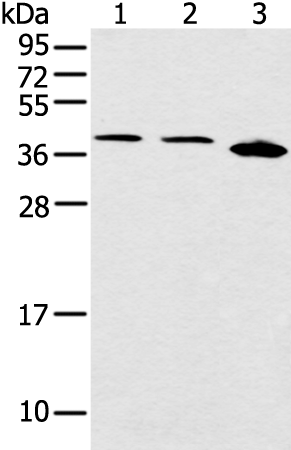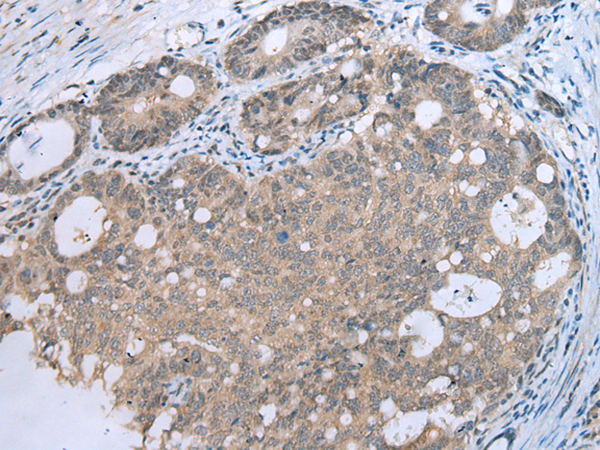

| WB | 咨询技术 | Human,Mouse,Rat |
| IF | 咨询技术 | Human,Mouse,Rat |
| IHC | 1/25-1/100 | Human,Mouse,Rat |
| ICC | 技术咨询 | Human,Mouse,Rat |
| FCM | 咨询技术 | Human,Mouse,Rat |
| Elisa | 1/2000-1/5000 | Human,Mouse,Rat |
| Aliases | CCNG |
| WB Predicted band size | 34 kDa |
| Host/Isotype | Rabbit IgG |
| Antibody Type | Primary antibody |
| Storage | Store at 4°C short term. Aliquot and store at -20°C long term. Avoid freeze/thaw cycles. |
| Species Reactivity | Human, Mouse, Rat |
| Immunogen | Synthetic peptide of human CCNG1 |
| Formulation | Purified antibody in PBS with 0.05% sodium azide and 50% glycerol. |
+ +
以下是关于CCNG1抗体的3篇参考文献的简要概括(注:以下内容为模拟示例,实际文献需根据具体数据库查询):
1. **文献名称**:*"Cyclin G1 modulates oxidative stress and apoptosis in cardiomyocytes via Nrf2/HO-1 signaling"*
**作者**:Li X, et al.
**摘要**:该研究利用CCNG1特异性抗体,通过Western blot和免疫荧光技术,发现CCNG1通过调控Nrf2/HO-1通路减轻心肌细胞氧化应激和凋亡,提示其在心脏疾病中的潜在保护作用。
2. **文献名称**:*"CCNG1 overexpression promotes tumor progression and predicts poor prognosis in colorectal cancer"*
**作者**:Wang Y, et al.
**摘要**:通过免疫组化(使用CCNG1抗体)分析结直肠癌组织样本,研究发现CCNG1高表达与肿瘤侵袭性及患者生存率降低显著相关,表明其可作为预后生物标志物。
3. **文献名称**:*"CCNG1 regulates DNA damage response through interaction with p53 in breast cancer"*
**作者**:Chen L, et al.
**摘要**:该研究通过免疫共沉淀(使用CCNG1抗体)和功能实验,揭示CCNG1与p53的相互作用在乳腺癌DNA损伤修复中的关键作用,为靶向治疗提供理论依据。
如需具体文献,建议在PubMed或Google Scholar中以“CCNG1 antibody”、“Cyclin G1 antibody”为关键词检索。
The CCNG1 antibody is a research tool targeting Cyclin G1 (CCNG1), a protein encoded by the *CCNG1* gene. Cyclin G1 belongs to the cyclin family, which regulates cell cycle progression by interacting with cyclin-dependent kinases (CDKs). Unlike classical cyclins, CCNG1 exhibits unique regulatory roles, including involvement in DNA damage response, cell cycle arrest, and apoptosis. It is transcriptionally activated by p53. a tumor suppressor protein, under stress conditions, suggesting its role in p53-mediated pathways. However, CCNG1 also displays p53-independent functions, complicating its mechanistic understanding.
CCNG1 is implicated in various cancers, with studies reporting both tumor-suppressive and oncogenic activities depending on context. Overexpression has been observed in breast, liver, and prostate cancers, while downregulation is linked to glioblastoma and lung cancer. This duality highlights its context-dependent role in tumorigenesis. The CCNG1 antibody is widely used in techniques like Western blotting, immunohistochemistry, and immunofluorescence to detect protein expression levels, cellular localization, and interactions in experimental models. Validated antibodies are critical for elucidating CCNG1's biological functions, its interplay with signaling networks (e.g., p53. mTOR), and potential therapeutic targeting. Researchers prioritize antibodies with high specificity, minimal cross-reactivity, and robust performance across sample types to ensure reliable data in studying CCNG1's contributions to cell cycle regulation and disease pathologies.
×